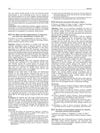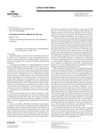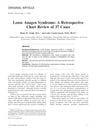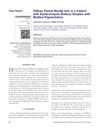1 citations,
February 2020 in “PubMed” The topical solution improved hair density and appearance in men with androgenetic alopecia.
 7 citations,
May 2022 in “The Journal of Dermatology”
7 citations,
May 2022 in “The Journal of Dermatology” Hair loss is a frequent long-term effect of COVID-19, and oral minoxidil is the most common effective treatment.
 6 citations,
April 2019 in “Nutrients”
6 citations,
April 2019 in “Nutrients” Biotin is important for keeping zinc levels balanced in the skin and its lack can cause hair loss.
 1 citations,
January 2010 in “Springer eBooks”
1 citations,
January 2010 in “Springer eBooks” Certain micronutrients may improve hair and nail health, but more research is needed to confirm their benefits.
 7 citations,
January 2010 in “Animal”
7 citations,
January 2010 in “Animal” Angora goat hair grows faster and produces more protein than cashmere goat hair, and certain hormones and nutrients positively affect hair growth and protein synthesis.
166 citations,
November 2008 in “Expert Review of Endocrinology & Metabolism” Biotin and biotinidase are essential to prevent health issues, and deficiencies require lifelong supplementation.
 74 citations,
July 1979 in “Lancet”
74 citations,
July 1979 in “Lancet” Biotin treatment can significantly improve hair loss and motor functions in certain metabolic disorders.
 January 2021 in “Scandinavian journal of clinical and laboratory investigation”
January 2021 in “Scandinavian journal of clinical and laboratory investigation” The document describes a way to measure biotin in blood to prevent wrong test results in hormone level testing.
86 citations,
January 1990 in “The Journal of Pediatrics” Children with partial biotinidase deficiency are healthy at birth but may develop symptoms that improve with biotin therapy.
55 citations,
December 1987 in “Archives of Dermatology” Two enzyme defects in biotin metabolism cause severe skin, hair, and metabolic issues.
9 citations,
October 1946 in “Experimental biology and medicine” Rats fed soybean oil meal lost hair, but adding inositol, biotin, cystine, or methionine to their diet prevented this and improved growth.
16 citations,
May 2009 in “Journal of child neurology” Valproic acid does not change biotinidase enzyme activity in children's blood.
September 2017 in “Hair transplant forum international” Biotin is popular for hair loss, but there's little scientific proof it works.
May 2022 in “Endocrine practice” High-dose biotin can cause false thyroid test results; stop taking biotin two days before testing to avoid errors.
 July 2018 in “International journal of clinical & experimental dermatology”
July 2018 in “International journal of clinical & experimental dermatology” Eat a balanced diet for healthy hair; only use supplements if you have a proven nutrient deficiency.
The supplement improved hair density and overall hair beauty.
4 citations,
January 2013 in “International Journal of Trichology” Monilethrix has no effective treatment, but avoiding hair trauma helps manage it.
 9 citations,
January 1981 in “Australian journal of biological sciences”
9 citations,
January 1981 in “Australian journal of biological sciences” Lambs fed a liquid diet showed abnormal wool and skin, which improved with more B-vitamins, suggesting a link to B-vitamin deficiency.
 June 2015 in “Journal of the turkish academy of dermatology”
June 2015 in “Journal of the turkish academy of dermatology” Eating the right foods is important for skin health and can help treat some skin conditions.

Biotin does not significantly help with hair growth.
 September 2024 in “Cosmoderma”
September 2024 in “Cosmoderma” Biotin doesn't help hair growth in healthy people and can cause health risks if overused.
 19 citations,
March 1988 in “International Journal of Dermatology”
19 citations,
March 1988 in “International Journal of Dermatology” Hair shaft dysplasias are abnormal hair conditions that can be inherited or acquired and may signal other health issues, with limited treatment options available.
 September 2009 in “European journal of paediatric neurology”
September 2009 in “European journal of paediatric neurology” Biotin supplements did not significantly reduce hair loss in rats on valproic acid.
 1 citations,
December 2017 in “Skin appendage disorders”
1 citations,
December 2017 in “Skin appendage disorders” Biotin may help women with hair loss who have low biotin levels, but more research is needed.
 13 citations,
July 2016 in “Pediatric Dermatology”
13 citations,
July 2016 in “Pediatric Dermatology” Loose Anagen Syndrome is more common in females and may be inherited, often confused with other hair disorders, and lacks evidence for biotin treatment effectiveness.
 14 citations,
June 2016 in “Pediatric Dermatology”
14 citations,
June 2016 in “Pediatric Dermatology” Some congenital hair disorders improve with age and can be managed with treatments like minoxidil, retinoids, supplements, and gentle hair care, but there's no cure.
 1 citations,
January 2014 in “International Journal of Trichology”
1 citations,
January 2014 in “International Journal of Trichology” A patient with a rare hair condition and skin disorder showed hair improvement after treatment.
 10 citations,
July 2018 in “Our Dermatology Online”
10 citations,
July 2018 in “Our Dermatology Online” Some vitamins and minerals are important for preventing hair loss, but treating hair loss with them without a known deficiency is not proven effective.
 April 2019 in “The journal of investigative dermatology/Journal of investigative dermatology”
April 2019 in “The journal of investigative dermatology/Journal of investigative dermatology” High potency topical steroids are the most effective treatment for pediatric alopecia areata.
6 citations,
January 2016 in “Pediatrics international” Japanese infants fed hydrolysate formula may have low biotin levels.


















